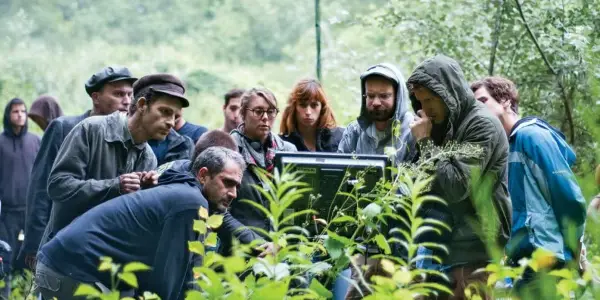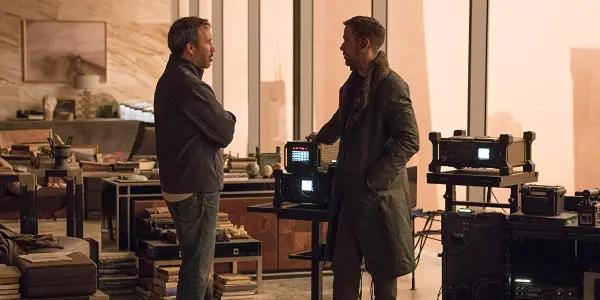The Rift Between Hungary’s Cinematographer Societies

Film critic, Ithaca College and University of St Andrews graduate,…
On Dec. 21, 2020, Hungary’s cinematography society split in two. Most of the country’s directors of photography had previously been members of the Hungarian Society of Cinematographers, but in December, Gábor Szabó and 30 other Hungarian cinematographers splintered off from the HSC and founded their own society, the Hungarian Cinematographers’ Association. Such a rift is highly unusual in the field, but in Hungary, it reveals growing political pressure on the country’s artists and cultural institutions.
The University Of Theatre And Film Arts
The University of Theatre and Film Arts in Budapest (SZFE), the 157-year-old school that trained many of the country’s most reputable actors and filmmakers, became the flashpoint of Hungary’s culture war in late 2020. After decades of relative autonomy under state control, the school was assigned a government-appointed board of trustees on Sept. 1. The decision prompted thousands of students to take to the streets in protest and many faculty, including On Body and Soul director Ildikó Enyedi, to resign.
SZFE is one of nine schools restructured by Hungarian authorities in recent years. Critics of the restructuring say that board members are loyal to Prime Minister Viktor Orbán and his administration and have no prior experience in art or culture. SZFE’s board includes two oil magnates, György Bacsa and Oszkár Világi; and Attila Vidnyánszky, the government-aligned director of the Hungarian Theatrical Society.
“They have all the rights and all the power,” Szabó said in an interview last September. “They make the decisions. [They] have nothing to do with filmmaking or cinematography or any connection to the profession. That’s why [the protests] started.”
On April 27, 2021, Hungary’s parliament passed legislation that would appoint similar foundations and boards to managerial roles in other Hungarian universities. Critics of the government say Orbán is seizing cultural power from Hungary’s liberal institutions, including SZFE.
Seemingly in response to these criticisms, Vidnyánszky appointed Emil Novák, a Hungarian cinematographer, to the position of SZFE’s rector in October 2020. At the time, Novák served as a member of the HSC’s board of directors. As the HSC had declared solidarity with the protesting students and faculty, many saw Novák’s appointment as controversial. Though he was supported by an internal investigation by the HSC Ethics Committee, Novák resigned his membership at the end of the month. He continues to serve as the university’s rector. (Novák did not respond to a request for an interview.)
Mátyás Erdély, DP on Son of Saul and Sunset, said this situation between the HSC and SZFE was what prompted him, Szabó, and dozens of other cinematographers to leave the organization. “We kind of talked about it between ourselves but never really did anything about it, but then this moment, when Emil Novák took [his] place in the board that was put over the film school, that basically triggered this avalanche effect,” he said. “We started to talk among ourselves, and we realized that we need to form our own society.”

“We all felt empathy, and we tried to support what’s happening with the university here,” said Miklós Buk, a cinematographer and camera operator known for his work on documentaries and short films. “The university for us is not just a building. It’s not just five years in our lives. It really roots us in the same cultural hummus. We are all from the same kind of material. [And] when [the] people were standing on the rooftops, there’s a very romantic element of it, and that’s why we wanted to [support] this whole new wave.”
Most of the HCA members, including On Body and Soul cinematographer Máté Herbai and Euphoria cinematographer Marcell Rév, studied at SZFE. Herbai, Rév, Buk, Szabó and Erdély are also founding HCA members and serve on its board.
“Practically A Dead Society”
Key to the cinematographers’ choice to leave the HSC were the reportedly serious problems besetting the organization. Szabó and Erdély said the HSC is poorly managed and overcrowded.
“What can we do with the 250 members there, which are not only cinematographers but also electricians, photographers, makeup [artists], and so many other people — technicians… so it absolutely lost the origin of meaning for the whole association,” said Szabó, cinematographer on The Revolt of Job, Meteo and Tirza, who currently serves as president of the HCA.
“Funnily, [the HSC] had more members than the German society, so in the last several decades, [to] actually have these three letters after your name stopped meaning that you were actually part of an elite, and it just became this group that wasn’t really doing anything and it wasn’t really meaning anything anymore,” Erdély said.
Szabó called the stagnant HSC “practically a dead society.” He also cited a lack of communication among members — none of the members had any way of contacting any other member, for example, except by going through the society’s secretary.
Communication is vital in a film industry such as Hungary’s, where there are no formal calls for work. Crew members, including cinematographers, instead have to rely on personal and professional connections, as well as networks such as cinematography societies, to secure jobs.
HSC President Balázs Sára declined to comment for this article.
The State Of Cinema In Hungary
While Hungary’s tumultuous political situation was not the primary motivator behind the HSC/HCA split, Orbán’s government is creating difficult working conditions for a film industry that already relies lopsidedly on American productions. Szabó said funding for projects now depends on the creators’ loyalty to the government.
“It’s not that mostly [dependent] on the subject of the film but mainly who is going to make it, and that person, how much loyalty [they have] to the government, so that’s the basic selection idea now,” he said.
Recent popular local Hungarian productions include Eternal Winter, Sunset and Those Who Remained, three period-piece productions centered around the World Wars and their effect on Hungarian life. Festival titles like Preparations to Be Together for an Unknown Period of Time, On Body and Soul and The Story of My Wife focus on drama and romance, without significant larger commentary on Hungarian culture or society. High-grossing films in Hungary in the past two years have been nearly all American productions (many of which, including Spy, Black Widow, Gemini Man, Blade Runner 2049, and Dune, were filmed in Hungary thanks to the country’s generous tax incentives), with the occasional Hungarian crime-thriller, action film, or animation.

“If you look at the people who are not getting funding for their new projects in the last couple of months, you could see that all the people that have been extremely successful with their projects in the last couple of years, and I’m talking about people with films winning in Berlin, getting an Oscar nomination, having been selected to Cannes in the main competition several times — all these people who have been proving themselves many times — their new projects are not getting funding,” Erdély said. “And there are a lot of people who are getting funding who are openly connected to the government, have zero professional filmmaking experience, and they’re getting funding for projects that even on paper are ridiculous.”
Like many Hungarian cinematographers, Erdély works on many projects outside of the country including The Nest, starring Jude Law, and the 2015 American indie James White. Erdély says he would return to Hungary for work, except that the most exciting filmmakers — the people he most wants to work with — aren’t receiving money from the government’s film fund. Many filmmakers have to work abroad simply due to the minuteness of Hungary’s industry.
“Because the country’s so small and the industry here’s very limited — [in terms of] finance and language — I think going abroad from Hungary as a cinematographer is something people keep doing,” Buk said.
Like many Hungarian cinematographers, Erdély and Buk studied at SZFE and went on to work or study overseas. But a new generation of Hungarian students, who are growing up seeing the privatization of prestigious art schools like SZFE, might see going abroad as the only option.
“It’s the new students who are not looking at Hungarian film school anymore as a possibility that is an effect of what’s happening,” Buk said. “So I know people — parents — that would rather pay a shitload of money to send their kids into British [schools], the London Film School, or [to] Denmark. In Europe, there are a lot of good film schools. At Łódź, they are not teaching in English, you have to learn in Polish, but people would rather do that than stay here and not get anything.”
At home, Szabó says polarization has divided filmmakers further. He and Buk say that this culture of clashing political ideologies is one of the reasons the HCA advertises itself as “politically independent.”
“This is the first time where it got so polarized that it actually got ripped apart,” Buk said. “Of course, there are people on the left and the right side in the art world as well, and there’s nothing wrong with that. But I’d never experienced such a thing that it really took a mark on us, and now we know people who are ‘right’ DPs and ‘left’ DPs, and now, it’s just so absurd.”
Conclusion: The Future Of The HCA
In mid-2021, the HCA gained membership with the International Federation of Cinematographers (IMAGO), a global network of cinematographer societies, film festivals and institutions. In the future, Szabó says he hopes to continue to grow the HCA and help get work for the Hungarian cinematographers who currently need it.
“We have a very, very solid membership,” Erdély said. “I think 99 percent of the cinematographers who matter in this country are members of the HCA.”
“We have a clear and very visible and see-through system that we all want to collect talent versus connections or relationships with power, but as long as we can keep this clean and pure in a way, it will attract people more who are thinking like that, so I think that’s a guarantee in terms of the future,” Buk said. “You somehow just carry a flag [for] what you believe in, what cinematography could be or should be.”
In terms of the broader stakes of Hungary’s politics, Erdély says they will have to wait for the next parliamentary elections, due for April 3, 2022. “It’s not an easy situation that the country is in,” he said. “And our little problems are nothing compared to the problems of health care workers. Our little problems are nothing compared to the problems of teachers and educators. Our little problems are nothing compared to many, many parts of Hungarian society who are not on the winning side of this system. This system is very brutal.”
As for the future of Hungarian cinema, these cinematographers are no strangers to adverse political conditions affecting the way they make movies. “Hungarian cinema has always been heavily dependent on the actual political system,” Erdély said. “I think now we are experiencing something not dissimilar to what we had during communism and how certain filmmakers were allowed to work and [even] got some money, some other filmmakers were heavily subsidized, and some filmmakers were totally forbidden from funding. [The] stakes are extremely high, and again, it’s not just about the filmmaking society or the filmmaking industry or the filmmaking world, but the whole country.”
What are your thoughts on the state of Hungarian cinema? Leave a comment below and let us know.
Does content like this matter to you?
Become a Member and support film journalism. Unlock access to all of Film Inquiry`s great articles. Join a community of like-minded readers who are passionate about cinema - get access to our private members Network, give back to independent filmmakers, and more.
Film critic, Ithaca College and University of St Andrews graduate, head of the "Paddington 2" fan club.













